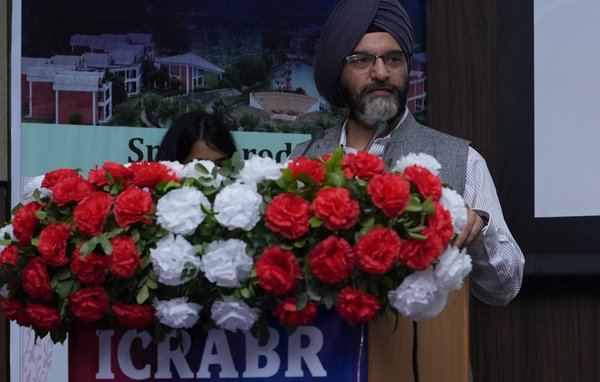- Share this article
- Subscribe to our newsletter
ICRABR 2023 – bioenergy important in meet rapidly increasing energy demand
ICRABR 2023 was organised by the Sardar Swaran Singh National Institute of Bio-Energy, took place in India from the 9th–12th October 2023. The diverse participation received from over 300 national and international participants from all these stakeholders fructified the aim of the conference. During the event, Bhupinder Singh Bhalla (IAS), Secretary, Ministry of New and Renewable Energy (MNRE), highlighted the importance of bioenergy to meet rapidly increasing energy demand in future and also informed participants about the vital support that the MNRE is providing for the sector to grow quickly in India. Furthermore, he advocated the scaling up of existing solutions and innovating to accelerate energy transition. And he launched a communication kit with information material on the Ministry’s schemes for better outreach of the National Bioenergy Programme. He also flagged off mobile vans that would go around different districts in the state of Punjab to spread awareness about the ill effects of stubble burning of biomass majorly paddy straw, and instead use it for various Bioenergy Projects under the National Bioenergy Programme.
Bioenergy-related technology solutions
In addition, the delegates got a glimpse of some of the advances in bioenergy from the stall exhibition at ICRABR, where several prominent industries and organisations showcased to the participants their bioenergy-related technology solutions in the field of Bio-CNG (Bio-Compressed Natural Gas), Lightweight Membrane Innovations for biogas domes, biomass pellets, etc.
On three days of the conference, there were multiple plenary and technical sessions on the different themes of the conference from distinguished scientists, faculty and scholars from the USA, Canada, Europe and other Asian countries. Broad themes of the conference included but were not limited to Biomass Resource Management, Biomass/waste conversion to energy, Biomass Valorisation/ Waste to value added materials/ Products, Modelling of Bio-energy systems, and Biorefinery and Biohydrogen. Sessions during the conference covered the latest research developments in bio-energy including case studies, state-of-the-art practices, supply chain management, financing, sustainability, carbon neutrality and policy aspects.
Bioenergy projects – from theory to practice
The session on field stories generated keen interest among the participants as they got to hear from people who have successfully implemented bioenergy projects on the ground, overcoming the real-time challenges faced when a technology gets translated from lab to land. The session included various presentations such as on the topic of ensuring food and energy security through carbon sequestration, where biochar was presented as a key solution. Another topic was livelihood opportunities in the bioenergy sector, with a focus on skills needs for the supply chain of raw materials. Further presentations focused on the manufacturing and installation as well as operation and maintenance of bioenergy plants and the use of biomass through agricultural waste management to improve farmers' income and access to energy. And finally, community biogas plants for decentralised energy generation and production of organic fertiliser in rural areas was highlighted.
A focus on innovative technologies
There were also presentations during the conference on emerging technologies such as high-rate biomethanation reactors having high organic loading rates with reduced digester sizes that can produce higher biogas yields in lesser retention times. Another innovative technology discussed was a Sandwich Gasifier that can produce a higher amount of clean syngas from variable feedstocks with minimal treatment. A further interesting presentation covered the Integrated Assessment Model to understand the multisectoral impacts of enhanced bioenergy implementation in India and provide science-based decision-support tools.
The fourth day of the conference witnessed an exciting Bioenergy Industry Exposure Visit of participants to Sukhbir Agro Energy Ltd. Biomass Power Plant in Ferozepur Dist., Punjab. It is an 18 megawatt capacity power plant that consumes around 600 tonnes of paddy straw in a day. The participants got a real-time feel of a live commercial bioenergy plant and understood the functioning and the scale of operations, including the storage, handling and transport of paddy straw required for running a large-scale bioenergy plant.
Cooperation is imperative
Discussions held during the conference also illustrated that collaboration remains the need of the hour for progress. They underscored that partnerships among government, industries, societal organisations, farmers and research institutions can shape a future where sustainable energy solutions will drive global progress. Particularly now, after the launch of the Global Biofuels Alliance during G20 by India’s Prime Minister Narendra Modi with the highlighted need to quickly achieve the Sustainable Development Goals, knowledge exchange between researchers across disciplines and regions is needed to enhance the dissemination of concepts and ideas.
Dr Vandit Vijay is currently working as a Scientist in the Biomass and Energy Management Division of the National Institute of Bio-Energy, India. His research focus is on biomass utilisation through different conversion pathways for energy sufficiency and carbon neutrality. Contact: vandit@nibe.res.in
More information:





Add a comment
Be the First to Comment